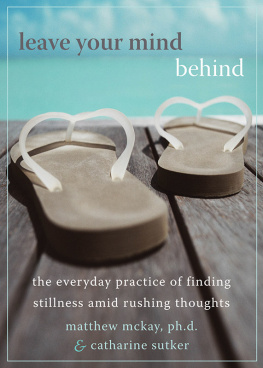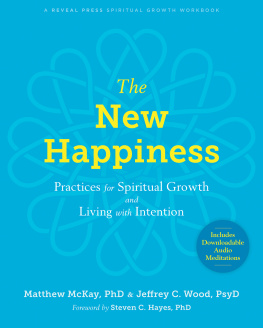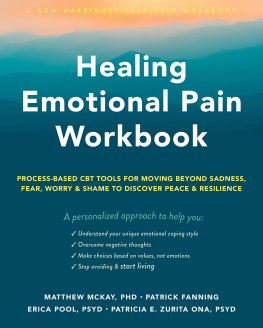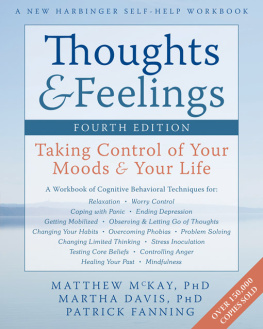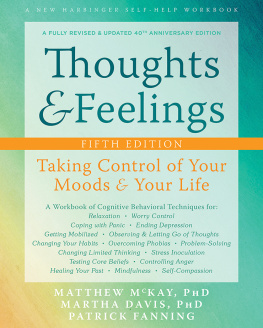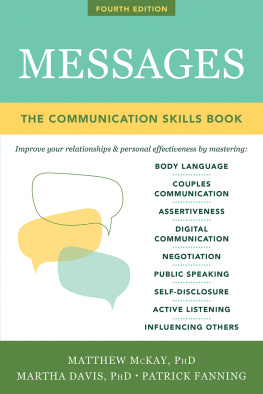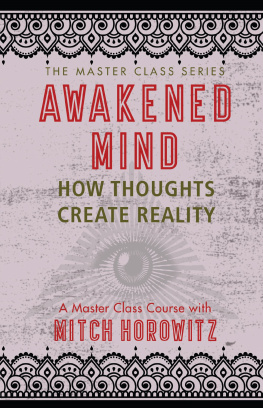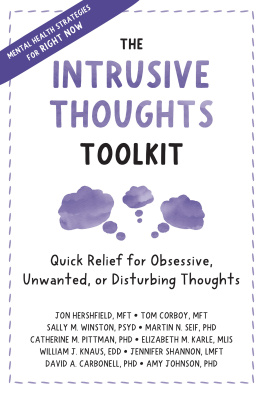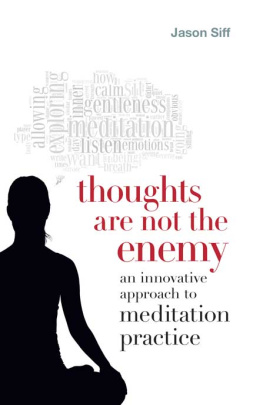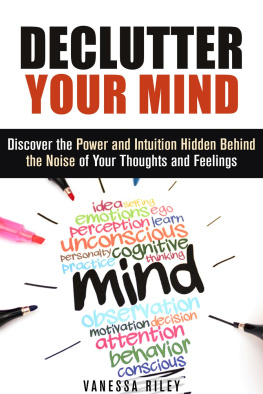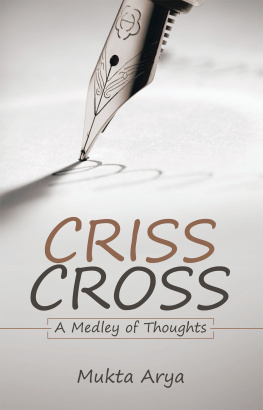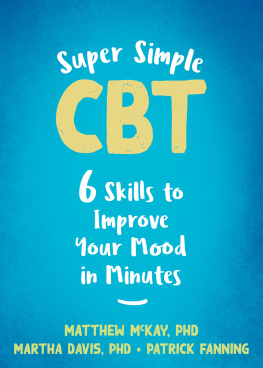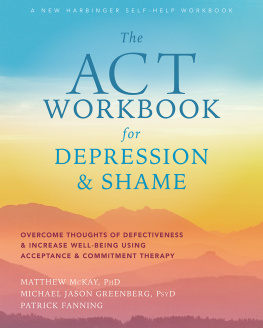acknowledgments
Grateful acknowledgement to Steven C. Hayes, Ph.D., Kelly G. Wilson, Ph.D., and Kirk Strosahl, Ph.D., and the entire ACT community, for developing an extraordinary therapy-acceptance and commitment therapy. This book is based on a component of that therapy, cognitive defusion.
Matthew McKay, Ph.D., is a professor at the Wright Institute in Berkeley, CA. He is the author and coauthor of more than twenty-five books, including TheRelaxation and Stress Reduction Workbook, Messages, When Anger Hurts, Self-Esteem,and The Self-Esteem Guided Journal. He received his Ph.D. in clinical psychology from the California School of Professional Psychology. In private practice, he specializes in the cognitive behavioral treatment of anxiety, anger, and depression.
Catharine Sutker is an editor and freelance writer living in the San Francisco Bay Area. She is the coauthor of The Self-Esteem Companion, The Self-Esteem Guided Journal, and The Self-Nourishment Companion.
watching now: the moving band meditation
everything you feel inside your body can be a focusing point for the present moment. Listening to your physical experience is like listening to a complex piece of music. There are major and subordinate melodies. There are themes that swell and fade away. Sensations may explode like the sudden crashing of cymbals or come on slowly like a crescendo played on an oboe.
One easy way to listen to your body and focus your attention on the experience right now is the Moving Band Meditation. Imagine a circular band of light, about three feet in diameter just above your head. In a moment, the band will begin to descend, moving slowly down your body. As it passes each point, from your forehead to your feet, try to observe your feelings in that place. Notice the quality of each sensation. Does it feel tight? Is it a dull ache? Is there a sense of pressure, or a sense of calm or release? As the band moves lower, let your attention shift to the new area it surrounds. Bring all your focus and awareness to bear on the parts of your body that lie within the band. Keep watching the band descend, in small increments, until you have listened to each sensation, each individual note of the bodys song.
Now expand your awareness to include the whole melody. Inhale a deep breath and let it go; take in everything your body feels. Listen for a moment with your whole attention. Then take another deep breath and end the exercise.
Go ahead now. Start the Moving Band Meditation. The most important thing about the meditation is what youre not doing. For the most part, you arent worrying, planning, remembering, explaining, or expecting. During these few moments, your mind has been quieter. It has been watching and listening. It has been living in this moment, and no other.
Think about these questions:
- How does focusing your mind on sensations, even for a few minutes, affect you emotionally?
- Is there a difference between the moving band experience when you focus on particular parts of the body and listening to your body as a whole?
- Does the meditation slow down your mind? Does it change the frequency or quality of your thoughts?
the workability test
the seven kinds of thoughts our minds makememory, observation, planning, judging, fortune-telling, and storytellingall help us function and thrive. All seven types of thoughts can be used in either helpful or harmful ways. Here are some examples:
- Ourmemoryhelps us retrieve information. It can be a source of joy as we connect back to important moments and people in our lives. Some folks are consumed by memories of loss or failure. Others spend so much time in the past that they lose their footing in the present.
- Observingthe moment can be calming. It also creates a rich and deeply felt experience of the now. But sometimes we need to stop observing and move into action, or else nothing will change.
- Judginghelps you evaluate whats good or bad for you and stay away from harmful stuff. But its also a club with which you can beat yourself and others. Harsh judgments can damage both your self-esteem and every close relationship.
- Storytellingis essential for explaining and making sense of things. But as we discussed earlier, it often runs amok with mind reading and the most negative interpretation of events.
- Planning(future thoughts) helps us solve problems and prepare for the future. But some people spend so much time planning and preparing that their current lives become a misery. Some years ago, the National Enquirer carried a story about a man who built his own RV. When he finished ten years, one heart attack, and no vacations later, his neglected wife and kids wondered what the point was.
- Fortune telling (future thoughts)helps you predict the future and avoid lifes potholes. If you know a lion lives in a certain cave, fortune telling helps you anticipate being eaten if you venture there. But fortune telling can turn into a torture, in which you sink into what if and imagine an endless string of possible but unlikely catastrophes.
- Fantasies (future thoughts)can be a source of pleasure as you imagine vacations, longed-for events, and future achievements. But fantasies can be dangerous because they often prevent you from taking the practical steps to make them come true. Or they end up depressing you because the fantasy makes your current life seem drab and empty by comparison.
Heres the million-dollar question: How do you know when your minds gone off the rails? How do you know when youre buying into thoughts that dont make sense? Rememberyour mind tends to believe everything it thinks. The answer lies in something called workability. How well is a certain, oft-repeated thought working for you? Is it helping you or not?
Lets use storytelling thoughts as an example. Can you remember several stories you tend to use a lot? These are stories about why certain things happen or dont happen, or about why you or others behave in specific ways. Now ask yourself these questions about each story: How has it worked for you? Does the story motivate you or make you give up? Does it make you feel good or bad about yourself? Does it help you do the things that matter to you, or does it make you afraid to move?
In general, a thought is workable when it enhances, expands, or opens your life; when it solves rather than creates problems. Thoughts are not workable when they constrict, inhibit, or close off your life.
Right now, wed like you to explore this workability criterion with some of your frequent thoughts. Examine carefully the effects of each thought. Does it help you live more fully, or is it shutting you down? If a thought isnt working for you, its time to stop believing in it. Instead, just notice it so you can begin to take it less seriously.
mental marriages
we have thoughts that automatically occur, and we dont really have the ability to suppress or stop them from happening. For instance, without trying to, fill in the blank words:
Rome wasnt built in a ______
Rudolph the Red-Nosed ______
Read one more, and try not to think of the word that follows:
Step on the crack; break your mamas ______
Heres the rub: this automatic linking occurs with your own thoughts and feelings. You have your own personalized built-in creative sayings like these clichs. Sometimes they come from your own experience, and at other times youve picked them up from god knows where. So, instead of Rome wasnt built in a day, yours might be something like, If I have to speak in public tomorrow, I will panic. I should stay at home. Perhaps your mind is telling you this because youve panicked in a public speaking situation before. Staying at home on subsequent occasions has made you feel safe. So youve learned the association

